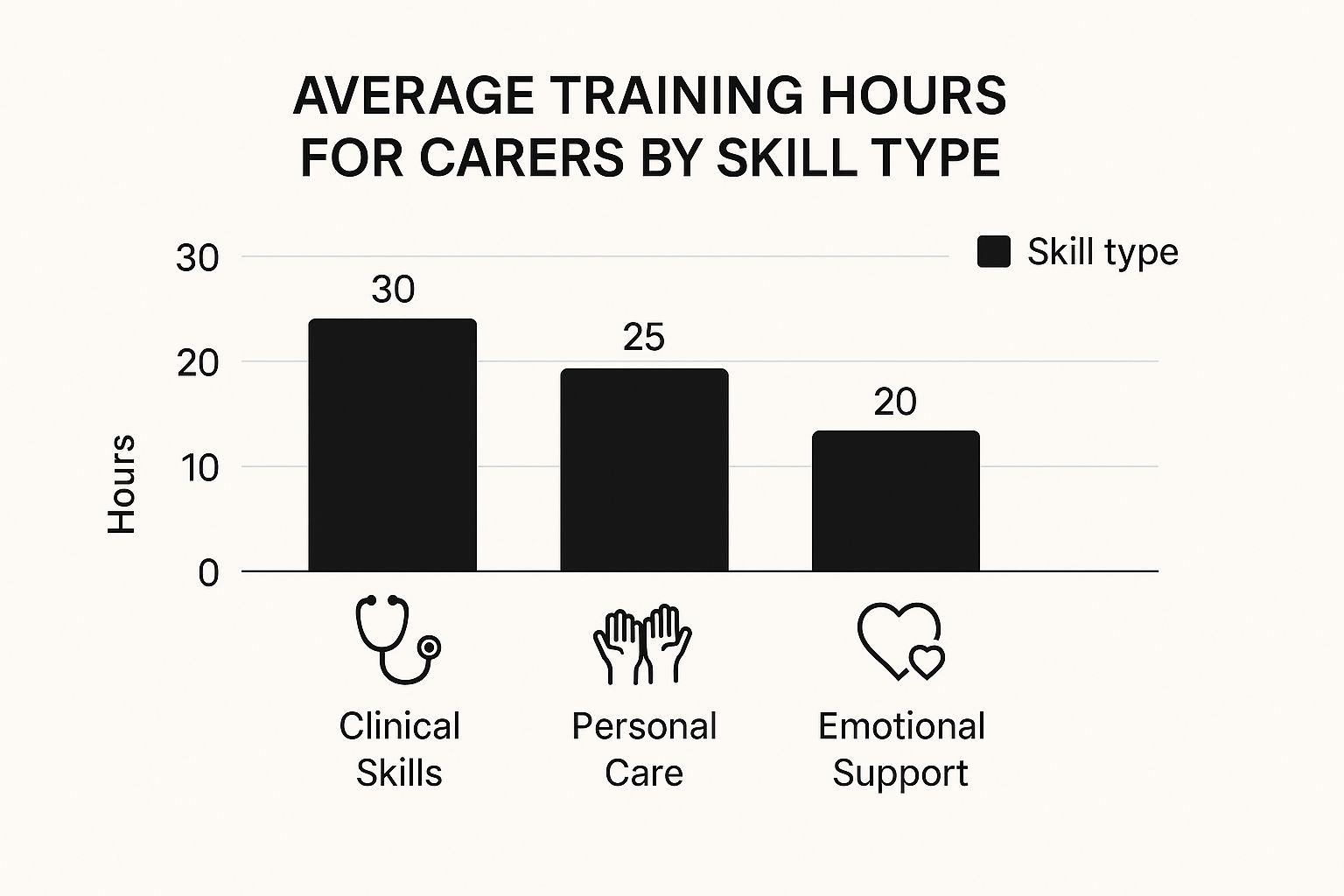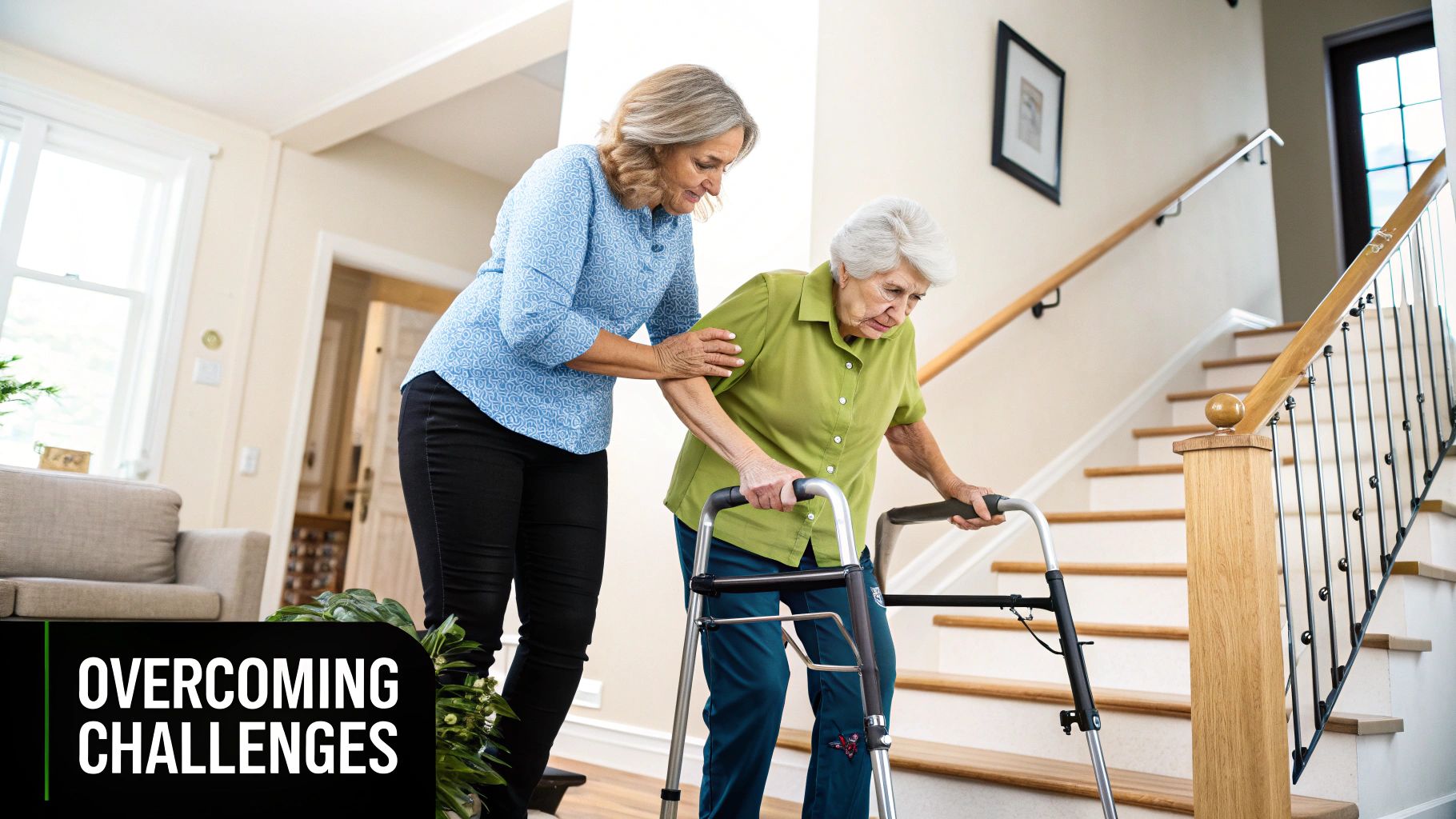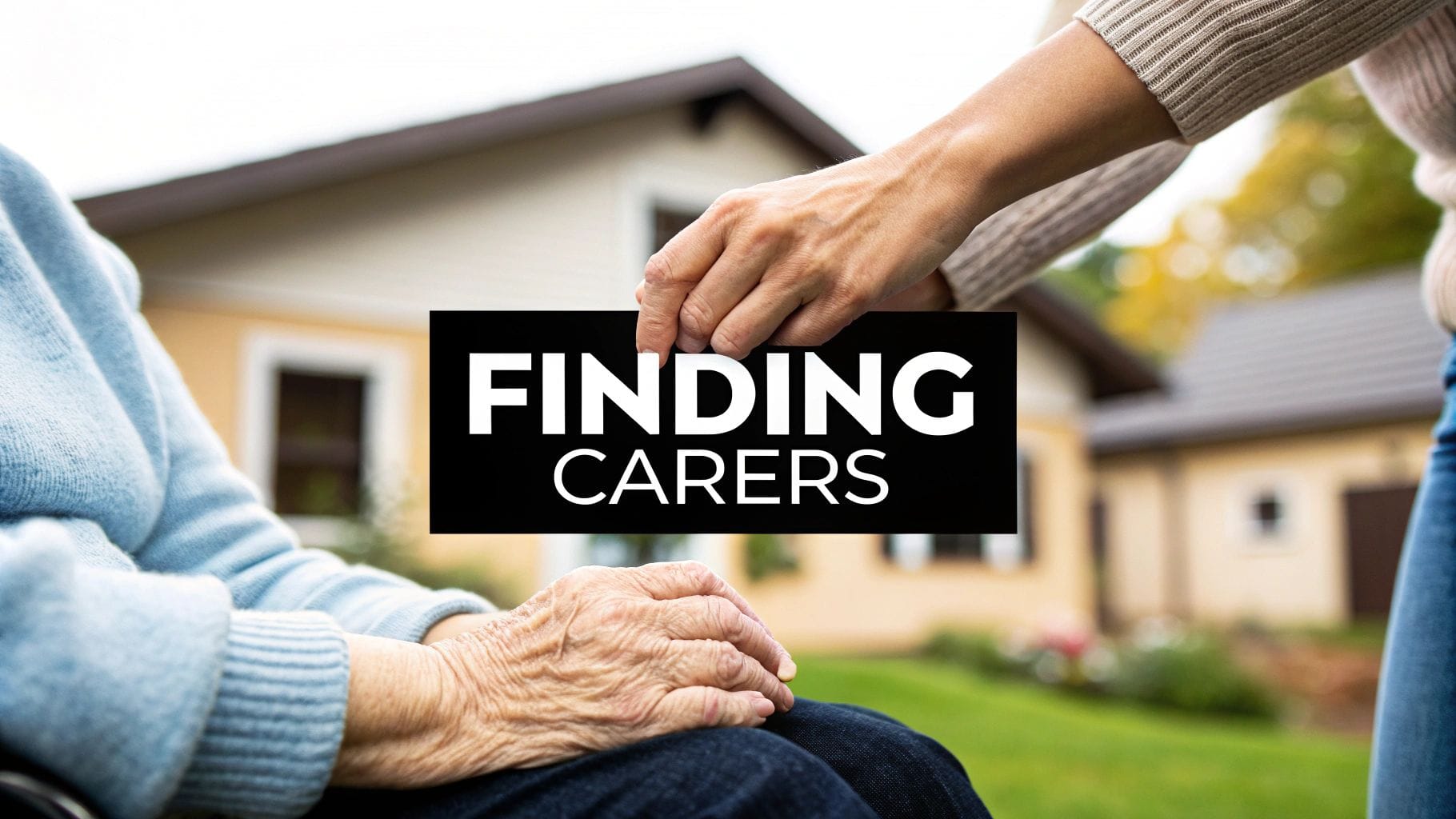It's a tough conversation and an even tougher realization: the moment you notice an elderly loved one might need more help than you can give. This isn't usually a sudden event but a slow trickle of small changes. Maybe mail is piling up, or they've missed doctor's appointments. Perhaps the house isn't as tidy as it used to be. Catching these early signs is the first, most important step in ensuring they're safe and living well.
Recognizing the Need for Elderly Care

The path to finding the right support often begins with a growing feeling that things are different. It's rarely a single crisis. Instead, it’s a collection of little moments that add up, signaling that your loved one needs a bit more support to get by.
Coming to this realization can be incredibly difficult. But try to see it as a positive, proactive step. You're not taking away their independence; you're building a support system that allows them to maintain it safely and with dignity. It’s a move made out of love, aimed at enhancing their quality of life.
The Subtle Signs to Watch For
The clues that professional care might be on the horizon aren't always dramatic. They’re often small struggles that, when seen together, paint a clearer picture. Paying attention to these details helps you get ahead of a problem before it becomes a crisis.
Keep an eye out for some of these common signs:
- Difficulty with Daily Tasks: Are they finding it harder to cook, keep the house clean, manage personal hygiene, or remember their medications? These can be early warnings.
- Changes in Physical Health: Have you noticed sudden weight loss, more bruises from falls, or that a chronic condition seems to be worsening? These are red flags.
- Social Withdrawal and Loneliness: A fading interest in hobbies, skipping social events, or showing signs of depression can point to a need for more companionship.
- Forgetfulness and Confusion: Forgetting appointments, misplacing keys or wallets more often, or getting confused about the day or time are all things to note.
The Growing Demand for Professional Carers
This need for dedicated, professional support is a reality for families across the country. In Australia, carers for the elderly are absolutely essential, especially with a rapidly aging population. Back in 2021, people aged 65 and over made up 16.7% of the population—that's about 4.31 million people. That number is expected to jump to 6.66 million.
This trend is clear when you look at aged care facilities, where the number of permanent residents grew by 39.9% between 1999 and 2023. This highlights a steady, increasing demand for professional care services. You can learn more about the growing need for elderly care in Australia.
By tuning into these initial signals, you can start exploring your options with confidence. Whether it’s finding someone for simple companionship or arranging for more intensive medical support, taking a proactive approach brings incredible peace of mind to everyone involved.
Comparing Your Elderly Care Options
Figuring out the right care for an elderly loved one can feel like trying to read a map without a legend. There are several different paths, and each one leads to a different kind of journey. Understanding what's out there is the first step to making a decision you can feel good about. The three main routes you'll encounter are in-home care, residential care, and respite care.
Let's walk through what each of these really means for you and your family. This will help you see which option fits best with your loved one’s health, their desire for independence, and what they truly want.
In-Home Care: Personalized Support in Familiar Surroundings
In-home care is just what it sounds like: a professional caregiver provides support right in the comfort of your loved one’s own home. The beauty of this option is its flexibility. It can be anything from a few hours of companionship a week to full-time, round-the-clock medical help from skilled carers for elderly individuals.
The biggest plus here is familiarity. Staying in a place filled with personal belongings and memories can do wonders for an older person's emotional well-being. This setup is perfect for someone who can still live safely at home but needs a hand with daily tasks like cooking, personal hygiene, remembering medications, or just getting around.
It’s no surprise that this is becoming the top choice for many families. In fact, studies show that around 70% of older adults would much rather receive care in their own homes.
Residential Care: Community Living with Constant Support
Residential care, which you might know as an aged care or nursing home, offers a structured, community-based living situation. This path provides 24/7 supervision, with medical and support staff always on-site. It's really designed for people whose care needs have become too complex or unsafe to manage at home.
This setting is a huge relief for families of seniors with serious medical conditions, advanced dementia, or major mobility challenges. Beyond just the medical side, these facilities also offer a chance for social connection through organized activities, group meals, and just being around other residents, which can be a powerful antidote to loneliness.
The decision to move to residential care usually happens when safety and the need for constant medical oversight become the absolute top priorities. It gives families peace of mind, knowing their loved one is in a secure place with immediate access to professional help if they need it.
Respite Care: A Vital Break for Family Carers
Respite care is a short-term solution that gives primary caregivers a much-needed break. Let's be honest—being a family caregiver is an incredibly tough job, and burnout is a very real risk. Respite care allows you to step away to recharge, whether it's for a few hours, a full day, or even a couple of weeks.
This type of care can happen in a few different ways:
- In-home respite: A professional carer comes to the house.
- Centre-based respite: The elderly person spends the day at a local community center.
- Residential respite: A short-term stay in an aged care facility.
Think of it as a support system for the supporters. It makes sure your loved one continues to get great care while you take time for yourself, which helps prevent exhaustion and keeps the whole family care arrangement sustainable for the long haul.
To help you visualize the differences, here's a quick comparison of the main elderly care options.
Comparison of Elderly Care Options
| Feature | Residential Care (Aged Care Home) | In-Home Care | Respite Care |
|---|---|---|---|
| Environment | Communal, structured facility | Client's own home, familiar surroundings | Varies (home, centre, or facility) |
| Level of Care | 24/7 medical and personal support | Flexible, from a few hours to 24/7 | Temporary, based on primary carer's needs |
| Best For | Complex medical needs, high dependency | Seniors who want to maintain independence | Providing temporary relief for family carers |
| Social Interaction | Structured activities with other residents | One-on-one companionship, community outings | Depends on the setting (group or one-on-one) |
| Independence | Limited personal autonomy | Maximized independence and routine | Varies; focuses on maintaining routine |
This table shows that the "best" choice really depends on individual circumstances—balancing medical needs with the desire for independence and a familiar environment.

For many families, in-home care strikes the perfect balance between professional support and personal freedom. Services can be adjusted as needs evolve, including bringing in specialized medical help when required. You can learn more about how nursing services at home provide this crucial level of support. Taking the time to weigh your options carefully is the best way to choose a path that truly honors your loved one’s needs and wishes.
How to Choose the Right Carer

Choosing a carer for an elderly family member is one of the most important decisions you'll make. It’s so much more than just going through a checklist. You're looking for a professional who won't just provide excellent care but will become a comforting and supportive presence in your loved one’s life.
Think of it like adding a key player to your family's team. You need someone with the right skills, of course, but also a genuine sense of compassion. The whole point is to find a personality match that makes your loved one feel safe, trusted, and happy day-to-day.
Vetting Technical Skills and Experience
First things first: you need to confirm the carer has the right professional background. These qualifications aren't just nice-to-haves; they're the non-negotiable foundation for safe and effective care. A well-qualified carer gives you peace of mind, especially when you’re dealing with specific health conditions.
Here’s what to look for:
- Formal Certifications: Make sure they have qualifications in aged care, individual support, or something similar. This shows they’ve had structured, professional training.
- Specialized Experience: If your loved one is managing dementia, diabetes, or has mobility challenges, you need a carer with real, hands-on experience in those areas.
- First Aid and CPR: These are absolute basics. Every carer must have these skills to handle an emergency with confidence.
- Police and Background Checks: A clean, recent background check is crucial. It’s all about safety and security.
Assessing the Crucial Soft Skills
While technical skills are the bedrock, it's the soft skills that truly make a carer exceptional. These are the human qualities—empathy, patience, and good communication—that build a strong, trusting relationship. These traits are just as important as any certificate on the wall.
These qualities are what separate a carer who just completes tasks from one who genuinely enriches your loved one's life. When you’re interviewing, watch how they listen and respond. Do they seem engaged? Compassionate? Easy to talk to?
A carer’s ability to connect on a human level is often the single most important factor in a successful caregiving relationship. It’s the empathy in their voice and the patience in their actions that build the foundation of trust.
This is why observing their personality is just as vital as reviewing their resume. If you're looking for that kind of comprehensive support, it helps to understand what professional caregivers can really offer. You can learn more about elderly and nursing care that provides compassionate support at home to get a clearer picture.
Actionable Interview Questions and Reference Checks
The interview is your chance to see both the hard and soft skills in action. Don't just ask about their work history. Use scenario-based questions to get a feel for how they solve problems and connect with people.
Try asking questions like these:
- "Can you tell me about a time you handled a difficult situation with a client? What happened?"
- "How do you communicate with a client who is feeling frustrated or doesn't want to cooperate?"
- "What steps do you take to make sure a client’s dignity and privacy are always respected?"
- "How do you keep families in the loop about their loved one's well-being or any changes you notice?"
After the interview, checking references is the final, critical step. Talk directly to previous employers or families they've worked for. Ask them specific questions about the carer's reliability, how they communicate, and how they handled challenges. This gives you an honest look at their professionalism and character, helping you make a decision you can feel good about.
Navigating Care Costs and Funding
Let’s be honest—the financial side of arranging care for an elderly loved one can feel like the biggest, most tangled hurdle. For most families, figuring out the costs is just as critical as finding the right person for the job. This part of the process is all about gaining clarity and making a solid plan, so you can secure top-notch care without getting hit by surprise bills down the road.
Talking about money can feel overwhelming, but when you break it down into smaller pieces, it becomes far more manageable. The goal here is to demystify the numbers, figure out what funding might be available, and build a plan that works for the long haul. With the right information, you can make confident choices that give your loved one security and you, peace of mind.
Breaking Down the Costs of Carers for Elderly
The price tag for hiring carers for elderly loved ones isn't a simple, one-size-fits-all number. It shifts quite a bit depending on the kind and level of support they need. For example, in-home care is usually priced by the hour, while a room in a residential facility will have a completely different fee structure.
Here are the usual cost components you’ll run into:
- Hourly Rates for In-Home Care: This is the standard for services like companionship, help with personal care, and light housekeeping. Expect rates to vary based on the time of day, with weekends and public holidays often costing more.
- Live-In or 24/7 Care Costs: When you need someone there around the clock, the cost is typically a daily or weekly flat rate. This is usually a more budget-friendly option than booking 24 separate hours of care.
- Residential Aged Care Fees: These are more structured. They often include a basic daily fee, a means-tested care fee (based on income), and sometimes separate payments for accommodation.
- Specialized Care Fees: Carers with extra training, like dementia care expertise or advanced nursing skills, will naturally have higher rates to reflect their specialized knowledge.
It’s crucial to get a detailed list of all potential charges right from the start. Ask about agency fees, travel costs, or any extras. A little thoroughness now can save you a lot of headaches later.
Understanding Government Funding Options
The good news is that government support is often available to help lighten the financial load. For in-home support, the most common type of help is a Home Care Package. This is a government-funded program specifically created to help older people get the services they need to continue living independently and safely at home.
A Home Care Package is more than just money; it's about empowerment. It gives your loved one the power to choose the services and carers that truly fit their life and preferences, putting them back in the driver's seat of their own care.
Getting one of these packages isn't just about income. The process begins with a detailed assessment to figure out the level of care needed. A member of an Aged Care Assessment Team (ACAT) will visit to chat about your loved one’s health, daily routine, and any specific challenges they face.
From there, they may be approved for one of four package levels, each with a different amount of funding. These funds are flexible and can be used for a whole range of services, from personal care and nursing to therapy. For example, some families use their funding to cover crucial medical check-ins, much like a home doctor visit in Dubai might offer, to ensure health is being monitored consistently.
Budgeting for Out-of-Pocket Expenses
Even with government funding, you'll likely have some out-of-pocket costs to cover. It's smart to plan for these from the get-go to make sure the care plan is sustainable. Your part of the payment, often called an income-tested care fee, is calculated after a formal income assessment.
To get a handle on your budget, follow these simple steps:
- Calculate All Income: Add up every source of income, including pensions, investments, and any other assets.
- Estimate Care Costs: Gather detailed quotes from the care providers you're considering.
- Factor in Government Subsidies: Subtract the amount covered by any approved funding packages.
- Identify the Gap: The number you're left with is what you'll need to cover yourself.
Laying it all out in a clear budget gives you a realistic view of the ongoing financial picture. This clarity frees you up to focus on what really matters—making sure your loved one gets the kind, professional support they deserve.
Understanding Regional Care Differences
Where you live can make a world of difference when you’re looking for the right carers for elderly family members. The kinds of care services available, and how easy they are to access, are rarely the same from one town to the next. It’s a lot like gardening—what flourishes in one climate might struggle in another, and the same goes for elderly care.
This isn't by chance. These differences are shaped by what's happening locally. Demographics are a huge factor; a community with a large retiree population is naturally going to have more aged care facilities and specialized home-care providers. A younger, more urban area, on the other hand, might offer a completely different set of services.
Getting a handle on your local situation from the start is a game-changer. It helps you set realistic expectations and narrow your search, saving you from the frustration of chasing options that just aren't available in your area.
Local Policies and Service Availability
State and territory policies have a massive impact on the care options you'll find. The way a government allocates funding, the regulations they place on providers, and local council programs all shape the services on offer. One state might pour money into building state-of-the-art residential homes, meaning there are plenty of spots available.
Another region might focus its efforts on community-based programs, leading to a robust network of in-home care agencies and senior day centers. This means one family might easily secure a place in a fantastic nursing home, while another, just a few hours' drive away, will find that high-quality in-home support is the more practical and abundant choice. It really shows why a universal approach to finding care just doesn't cut it.
The "best" care is often the one that’s most practical and sustainable right where you are. Acknowledging these regional differences is the first step toward finding a solution that genuinely works for your family.
The numbers back this up. Looking at Australia, for example, the use of aged care services shifts dramatically between states and territories. For permanent residential care, South Australia had the highest usage rate at 44 per 1,000 people, while the Northern Territory had the lowest at 21 per 1,000. The same goes for home care packages, where South Australia again led with 64 per 1,000, and the Australian Capital Territory was lowest at 37 per 1,000. These stats show just how much your location influences the reliance on different types of carers. You can see more details about people using aged care in Australia.
How to Research Your Local Care Landscape
Once you know that location matters, you can start a much more focused search. The goal is to figure out what your specific area does well. Being proactive here will save you a ton of time and point you toward the most realistic options for your loved one.
Here are a few practical steps to get you started:
- Contact Your Local Council: They’re often a goldmine of information, with directories and details on subsidized programs available only to local residents.
- Use Government Service Finders: Official government websites usually have search tools that let you find accredited providers right in your postcode.
- Talk to Healthcare Professionals: Your local GP or a community social worker has on-the-ground knowledge of the most reputable providers and services in the area.
By putting in the time to understand your local environment, you can navigate the system much more effectively. For families in a major city, for instance, there's often a wider variety of specialized services. You can get a sense of how metropolitan services are structured by learning more about finding quality elder care at home in Dubai. This initial groundwork is what helps you land on a care solution that is practical, sustainable, and truly high-quality.
How After-Hours Medical Support Can Help

The life of a carer for the elderly is filled with rewarding moments, but it's also unpredictable. Health issues don't stick to a 9-to-5 schedule. A sudden high fever, a confusing reaction to medication, or even a minor fall after dinner can quickly turn a quiet evening into a high-stress situation. This is precisely where having reliable, after-hours medical support becomes a non-negotiable part of any solid care plan.
Think of it as a safety net for your loved one's health. Instead of the default reaction being a frantic rush to the emergency room for every concern, an accessible doctor who can make a house call provides immediate assessment and, just as importantly, reassurance. This doesn't replace the carer; it empowers them with professional medical backup right when they need it most.
Services like Call to Doctor were created to fill this critical gap between a routine GP visit and a full-blown emergency. By bringing a qualified doctor right to the home, we help families sidestep the exhaustion and anxiety of late-night hospital trips for conditions that can be safely managed right where they are.
Reducing Stressful Emergency Room Visits
Let's be honest: not every health scare is a true emergency that requires a hospital. Many common issues that seniors face—like urinary tract infections, breathing difficulties, or needing a medication adjustment—can be handled effectively and safely at home with a doctor's guidance. These situations feel urgent, but they don't always need the chaotic environment of an ER.
An in-home doctor visit provides a calm, focused alternative. The doctor can conduct a proper assessment in a familiar setting, where your loved one is most comfortable and at ease. This drastically lowers the stress for the senior and offers incredible relief to worried family members and their dedicated carer.
Having a medical professional diagnose and create a treatment plan right in your living room, especially after hours, is a game-changer. It turns a potential crisis into a manageable event, ensuring both physical health and emotional calm are top priorities.
This proactive model keeps seniors safer and more comfortable at home while freeing up hospital resources for those who genuinely need them. It's simply a smarter, more compassionate way to approach elderly healthcare.
Integrating Medical Support into the Care Plan
The best care strategies are coordinated and seamless. After-hours medical services aren't just about reacting to problems; they're about integrating into the ongoing care plan your primary carer already has in place. This teamwork builds a powerful and responsive support network around your loved one.
Here’s what that looks like in the real world:
- The Situation: A carer is looking after an elderly gentleman with a known heart condition. Late on a Friday night, he develops a nasty cough and seems to be struggling for breath. Is it just a cold, or something more? The carer is understandably worried.
- The Action: Instead of immediately calling an ambulance and facing a long night at the hospital, the carer contacts an in-home doctor service. A physician arrives in under an hour to perform a full examination.
- The Outcome: The doctor diagnoses a minor respiratory infection, prescribes the right medication, and updates the patient’s medical records on the spot. He gives the carer clear, simple instructions on what to watch for and schedules a follow-up.
This seamless teamwork prevents a potentially traumatic and unnecessary hospital visit, ensuring total continuity of care. The doctor, carer, and family are all in sync, working together. That collaboration provides priceless peace of mind, knowing that expert help is always just a phone call away, no matter the time of day or night.
Common Questions About Finding Carers
Stepping into the world of elderly care can feel overwhelming, and it’s natural to have a lot of questions. Getting clear, straightforward answers can make the whole process feel much less stressful. Think of this section as your go-to guide for tackling the common hurdles families face when looking for carers for elderly loved ones.
It’s here to cut through the noise and give you practical answers so you can move forward with confidence.
What Is the Very First Step in Finding Care?
Before you even think about calling an agency or looking at profiles, the first and most critical step is a thorough needs assessment. You have to get a clear picture of what's actually needed.
Take a moment to honestly evaluate your loved one's situation. How is their physical and cognitive health? What about their mobility? Can they still handle daily tasks like cooking, cleaning, and personal hygiene on their own? Most importantly, you need to have a frank conversation with them about what they want. Bringing their perspective in from the very beginning makes it so much easier to find the right solution, whether that’s bringing support into their home or considering a residential facility.
How Can I Be Sure a Carer Is Trustworthy?
Trust is everything in a caregiving relationship. It's the foundation it's all built on.
If you're going through a professional agency, the first thing you should ask about is their vetting process. Any reputable company will conduct comprehensive police and background checks on every single staff member and have non-negotiable training standards.
Decided to hire someone directly? That responsibility falls on your shoulders. Always insist on face-to-face interviews, ask for several professional references (and actually call them), and think about a trial period to see if it’s a good personality fit. Compatibility is just as important as qualifications, so don't ignore your gut feeling. This is especially true for roles requiring medical skills, which highlights the importance of knowing the difference between a carer and a nurse. You can get a better sense of the specific duties of home nurses in Dubai in our detailed guide.
Choosing a carer is about more than just filling a position; you’re inviting someone into your family’s life. Verifying their credentials and feeling a real, human connection are both vital for building a foundation of safety and trust.
Does Government Funding Cover All Care Types?
While government funding is a massive help, it's definitely not a catch-all solution.
Programs like Home Care Packages are built specifically to help seniors get the support they need to stay in their own homes safely and independently. That funding can be used for a whole range of things, from personal assistance and clinical care to making modifications around the house.
Residential aged care, on the other hand, is a completely different ballgame. It runs on its own funding model with its own subsidies and means-tested fees. You have to figure out exactly which funding source applies to your situation to budget properly and avoid any nasty financial surprises down the road.
When you need reliable, professional support for your loved ones, Call to Doctor provides compassionate and skilled carers and nurses to meet your family's needs. We bring expert care directly to your doorstep, ensuring safety, comfort, and peace of mind. Learn more about our elderly care services.



Leave a Reply